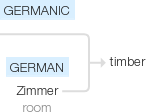Timber
Old English in the sense ‘a building’, also ‘building material’, of Germanic origin; related to German Zimmer ‘room’, from an Indo-European root meaning ‘build’.
wiktionary
From Middle English tymber, from Old English timber, from Proto-Germanic *timrą, from Proto-Indo-European *dem-(“build, house”) (see Proto-Indo-European *dṓm). Cognates include Dutch timmer, Old High German zimbar (German Zimmer), Norwegian tømmer, Old Norse timbr, Gothic 𐍄𐌹𐌼𐍂𐌾𐌰𐌽( timrjan, “to build”), Latin domus and Ancient Greek δόμος(dómos).
timber
etymonline
timber (n.)
Old English timber "building, structure," in late Old English "building material, trees suitable for building," and "trees or woods in general," from Proto-Germanic *tem(b)ra- (source also of Old Saxon timbar "a building, room," Old Frisian timber "wood, building," Old High German zimbar "timber, wooden dwelling, room," Old Norse timbr "timber," German Zimmer "room"), from PIE *deme- "to build," possibly a form of the root *dem- meaning "house, household" (source of Greek domos, Latin domus).
The related Old English verb timbran, timbrian was the chief word for "to build" (compare Dutch timmeren, German zimmern). As a call of warning when a cut tree is about to fall, it is attested from 1912 in Canadian English. Timbers in the nautical slang sense (see shiver (v.2)) is from the specialized meaning "pieces of wood composing the frames of a ship's hull" (1748).
The timber-wolf (1846) of the U.S. West is the gray wolf, not confined to forests but so-called to distinguish it from the prairie-wolf (coyote).
